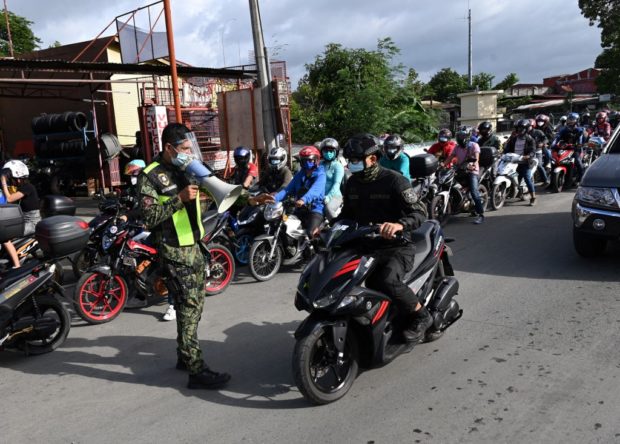
A policeman using a megaphone calls out a fellow policeman as he guides motorists at a border check point in Marikina City, suburban Manila on August 6, 2021, after authorities imposed another lockdown to slow the spread of the hyper-contagious Delta variant and ease pressure on hospitals while trying to avoid crushing economic activity. (Photo by Ted ALJIBE / AFP)
MANILA, Philippines — Trade Secretary Ramon Lopez on Wednesday made a point of the need for Metro Manila to revert to a less stringent quarantine status “at the soonest possible” time in order to stimulate the ailing economy beset by the coronavirus pandemic.
Alongside the shift to a more relaxed quarantine status, Lopez said NCR cities should impose more granular lockdowns in areas where there is a spike in COVID-19 cases.
“At the soonest possible time, to the extent that we can, we really have to go down at least to MECQ (modified enhanced community quarantine) and do more granular lockdown,” Lopez told the Kapihan sa Manila Bay forum.
“Yan ang position namin [That’s our position]… do more granular lockdown and also at the end of the day, ang i-minimize natin yung [what we should minimize are the] non-essential activities,” he added.
The government placed Metro Manila under enhanced community quarantine (ECQ), the government’s strictest, quarantine classification, from Aug. 6 until Aug. 20. This quarantine status can either be extended or shifted to a less restrictive classification later on.
Socioeconomic Planning Secretary Karl Kendrick Chua earlier said the two-week ECQ will likely cost the economy P300 billion in output losses.
“We know the economic cost of ECQ. [This is an] immediate move talaga na ginawa lang [that was done] to prevent the surge that we were seeing the increasing growth trajectory nung [of the] cases. So, that’s the reason why we eventually agreed na rin sa [to an] ECQ,” Lopez said.
“Remember, kami yung ayaw ng [we are among those who opposed an] ECQ. On one hand, we have to listen to the experts and look at the data and if you imagine what happened in Indonesia, in India, ayaw mo talaga mangyari dito ‘yan [we really don’t want that to happen here],” he added.
Severe, critical cases
Meanwhile, Lopez said he suggested to the Inter-Agency Task Force (IATF) for the Management of Emerging Infectious Diseases that the number of severe and critical cases be also considered in determining which quarantine classification should be imposed in certain areas.
“In fairness to IATF, meron talaga kaming approved parameters. Pinapadagdag ko lang ito. Right now, balanse naman yung [parameters], we even look at the economic impact, yung mawawala during ECQ…aside from the health consideration,” he said.
(In fairness to IATF, we have approved parameters. I just want this to be added to that consideration. Right now, the IATF’s parameters are balances, we even look at the economic impact, how much we will lose during the ECQ…aside from the health consideration.)
“Pero hindi nako-consider pa yung itong severe at critical. Ang view lang natin, medyo tignan din ito yung tracking ng severe and critical that might help us balance yung view dun sa health side,” he further said.
(But the number of severe and critical cases, our view is just, we should also look at the severe and critical [cases] that might help us balance the health side.)
On Tuesday, the Philippines logged 8,560 additional COVID-19 infections, pushing the number of active cases to nearly 80,000.
In total, the country has confirmed 1,676,156 cases since the start of the pandemic early last year.